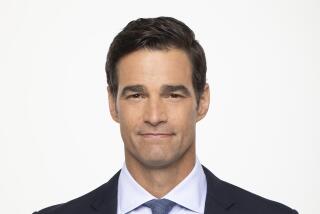Partial sunshine amid drizzle
THE jawline cuts with the same diamond precision. The platypus lips are as delectably thickset as ever. And the subtle wave in her reddish-brown hasn’t lost its power to hypnotize. But Joe Mantello’s production of “Three Days of Rain” at the Bernard B. Jacobs Theatre strangely muffles the nuclear star power in its midst.
Julia Roberts’ Broadway debut may have engendered press hysteria not seen in the theater since Madonna’s 1988 UFO-like appearance in David Mamet’s “Speed-the-Plow,” but onstage Pretty Woman doesn’t yet warrant all the commotion.
OK, we’ve always known Roberts is a better actress than Madonna. And she’s so irresistible, we all want her to succeed. The good news is that she’s revealing the artistic courage needed to avoid getting trapped in an increasingly remote Hollywood supernova. And for a first-timer, she’s acquitting herself adequately. There’s no reason for her to hang her head.
But Roberts is going to need regular practice if she’s to lose the inhibitions that, despite her unmatched radiance, cause her occasionally to get lost in the woodwork -- unthinkable, if not physically impossible for her, in film. She’s also going to have to choose a director next time who understands her gifts and can help her find material that will release them at full strength.
Though it offers her not just one but two roles, Richard Greenberg’s play -- originally commissioned by South Coast Repertory, where it had its world premiere in 1997 -- isn’t the ticket. Nor is it the glamorous star vehicle her legion of fans shelling out C-notes might be expecting. Suffice it to say that half the time she’s veiled in an overcoat, the other half in a baggy men’s bathrobe.
A majestic acrostic replete with gale-force verbal arias, “Three Days of Rain” is an intelligent and highly polished piece of writing that never quite rises to the level of memorable drama. What probably seemed a relatively safe and vanity-free way to get her feet wet has turned into a less than ideal (and more tricky than at first glance) challenge that we can only hope won’t keep her from returning for a second try.
The play is divided neatly into two parts. The first involves Walker (Paul Rudd) and Nan (Roberts), a wealthy, overeducated brother and sister of a distinctly neurotic stripe, who are waiting to hear what their illustrious architect father has left them a year after his death. First alone together, then with Pip (Bradley Cooper), a seductively attractive and irritatingly easygoing friend from childhood, they recount the seismic parental personalities that have left all three quaking in their wake.
The second half features an equally high-strung trio of roughly the same age: Lina (Roberts) and Ned (Rudd), the siblings’ mother and father before they became romantically involved, and their father’s business partner, Theo (Cooper), a fiendishly temperamental architect who will eventually become Pip’s father. At this point, however, Theo is enmeshed in a combative relationship with Lina, a volatile Southerner who’s likened to “Zelda Fitzgerald’s less stable sister.” He also claims to be professionally propping up Ned, though it’s never clear who is the firm’s real architectural genius.
THE diptych structure, complicated though it is to sum up, makes an extremely tidy thematic point. While the plot concerns the legacy of a landmark house that launched Ned and Theo’s stratospheric reputations, the play, set throughout the loft space in which the prized architectural plans were first laid, reveals the impossibility of one generation correctly decoding the motives and madness of its immediate predecessor.
Greenberg’s title refers to a line in Ned’s journal, found by his unbalanced son Walker, which obscurely refers to a period in April before his marriage as “three days of rain.” Exasperated by his father’s reticence even from beyond the grave, Walker wants to unlock crucial family secrets but instead must make do with an infernal weather report.
For Greenberg, the past isn’t so much another country as a different zone of reality that follows its own laws of logic and emotional grammar. Meticulously crafted, though underwhelming in its visceral payoff, “Three Days of Rain” reads more profoundly than it plays. But there’s no denying that its sometimes dazzling (sometimes just pretentious) language has a theatricality that in the right hands can float magnificently across the stage.
The play found those hands in its 1997 New York premiere. Memorably directed by Evan Yionoulis, the Manhattan Theatre Club production starred Patricia Clarkson, along with two talents quickly making their marks on and off Broadway, John Slattery and Bradley Whitford. Everyone in that unforgettable cast had serious theater chops, which isn’t to make invidious comparisons. Yet it’s important to note that Greenberg’s playwriting isn’t the realism of TV or movies but an intellectually giddy theatrical idiom that invites breathless flamboyance and histrionic daring.
Mantello adopts a more naturalistic approach. It’s not totally wrongheaded, but it turns into something that’s too often prosaic and flat. These characters, after all, are eccentrically theatrical, which is why they can flit into direct-address monologues without any awkwardness. They’re accustomed to performing their identities to a public that’s invariably impressed by their sophistication and sheen.
Rudd has his share of moments, particularly in Act 2 as the stammering Ned, whose dreams are gargantuan. And his portrayal of Walker has plenty of boyish charm. Trouble is, he’s not quite believable as a garrulous aesthete who wants to wrap the world in his idiosyncratically warped descriptions. A more handsomely sullen than brilliantly manic presence, he fails to give Walker the necessary helium lift.
Cooper revels in the differing yet related forms of narcissism that inspire both Pip and Theo to long flights of self-regarding loquacity. At times, though, his Pip seems more like a corporate attorney than an actor on daytime television (a profession, Pip proudly tells us, that fits the mediocrity of his talent). Come to think of it, Cooper turns Theo into a bit of rambling lawyer too. But if he fails to find the artistic delicacy of his characters, he understands the striving behind their charismatic aggression.
Roberts seems to be hunting for her characters within her own palette of experience rather than reaching out to theirs. Her beauty is Olympian, but her personality is that of the girl next door. Nan, a wealthy Bostonian, probably doesn’t have many neighbors, and Lina, a crazy, artsy arriviste, wants to get rid of hers.
That air of extravagant cultivation just isn’t there. One minor change to the original text is telling. Nan asks Walker which German writer compared architecture to “frozen music.” She offers Goethe, but in the updated version she merely says, “I don’t remember his name.” Why can’t Roberts say Goethe? Nan has no doubt read a little “Faust” in an upper-level college German class.
ANOTHER missing literary reference is to the less highbrow Maxwell Anderson (this one by Pip). The effect of these little modifications is to suggest that the characters before us really aren’t comfortable in Greenberg’s rarefied ether. They’re more regular sorts, which only makes their irregular behavior seem harder to comprehend.
A Tony-winning actress and teacher once spoke praisingly to me (in an informal, not meant for the record conversation) of Clarkson’s performance in “Three Days of Rain.” She said, and I paraphrase, that Clarkson created something human out of a cascade of glorious words. The task has an extraordinarily high level of difficulty, and one can only acknowledge Roberts’ fearlessness in taking it on.
Sure, it’s a drizzly beginning, but that shouldn’t deter a star whose curtain-call smile is like something from the other side of the rainbow. Let’s hope Roberts sticks around the theater long enough to show us what she can do.
More to Read
The biggest entertainment stories
Get our big stories about Hollywood, film, television, music, arts, culture and more right in your inbox as soon as they publish.
You may occasionally receive promotional content from the Los Angeles Times.







